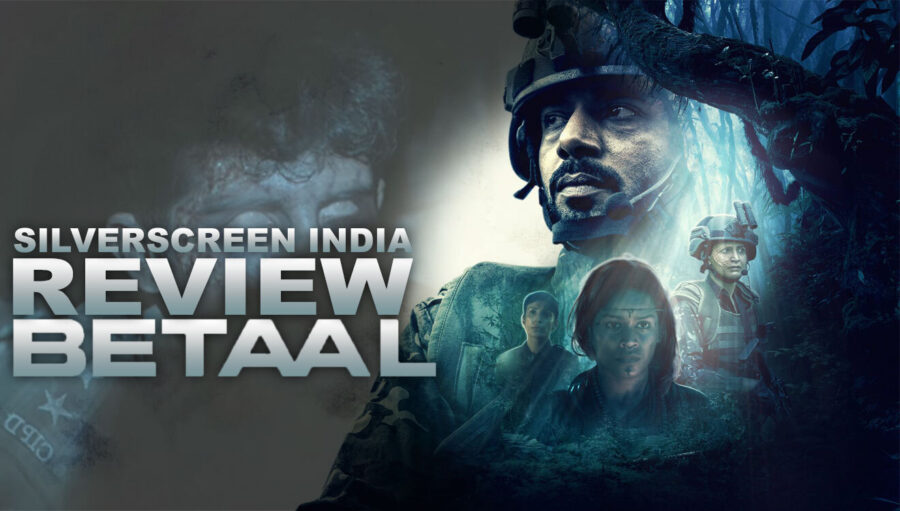Normally, a four-episode miniseries would be a respite, given the current ecosystem of indulgent Indian storytelling. In the last two years, my most common refrain against prestige Indian TV has been that it can sometimes excitedly drag itself to a point beyond redemption. Like movies that run under two hours, any show that displays an inclination to willingly restrict itself becomes by default a far more interesting bargain. In that sense, Betaal, Netflix India’s newest offering, created, co-directed and co-written by Patrick Graham, who earlier used the miniseries format to his advantage with Ghoul, comes packaged with an upper hand. And yet the zombie thriller – another Netflix misfire in a series of misfires – somehow manages to be too long, repetitive and needlessly convoluted, stretching its one-line plot, glaringly under-written, way too thin.
Produced by Shah Rukh Khan’s Red Chillies Entertainment (also behind last year’s irredeemable Bard of Blood) Betaal unfolds in the span of one day in Chattisgarh’s Nilja village and revolves around a clash between the tribals and a special task force called the Baaz Squad. Led by Commander Tyagi (Suchitra Pillai) and her two officers Vikram Sirohi (Vineet Kumar Singh) and DC Ahluwalia (Aahana Kumra), the squad is brought in by Mudhalvan (Jitendra Joshi of Sacred Games fame), a private contractor tasked with clearing a tunnel to build a government-approved highway.
The problem is the uncooperative, superstitious villagers standing in their way. They believe that the tunnel is cursed and opening it might result in untoward consequences—mainly reawakening an army of bloodthirsty British zombie soldiers.
Written by Graham and Suhani Kanwar (both of them co-wrote the lacklustre Leila), Betaal’s premise intends to build on the ambitious genre of socio-political Hindi horror that Graham so deftly articulated in Ghoul. There’s the obvious examination of government-enabled corporate greed that devalues the rights of tribals—the show’s setting in Chhattisgarh, a state that frequently makes headlines for uprooting tribal communities through forced land acquisition, makes for an air-tight layer of social commentary.
By invoking the spirit of the East India Company in its plot and squaring them against an Indian force, Betaal also seeks to underline neo-colonialism as well as explore the idea of duty for men in uniform. Then there’s a forced sub-plot about gender discrimination.
The problem is that they fall short on every account, delivering a shoddy, childish zombie outing that lacks both narrative depth and technical finesse. Take away the bells and whistles and the show even fails to deliver as a worthwhile genre outing. It’s as if someone decided to go ahead with the rough draft of the script’s first version instead of making revisions to it.
In a way, Betaal feels like it is in a prison of Graham’s own making. The show is visibly inspired by Ghoul and tries to relentlessly ape it. But Ghoul’s strength was its pointed commentary. Its interpretation of sectarian violence, rabid intolerance, and systemic ethnic cleansing carried out by the state touched a nerve not because Graham dialed up the theatrics but because it was eerily specific and imbued with purpose.
The show’s politics wouldn’t have come across as powerful had its creator not had a simultaneous grip on what he was saying and who he was saying it against. Betaal has none of that coherence or precision. Even when it touches upon the ills of development and the commercialisation of patriotism that dictates who gets labelled an insurgent and who becomes a hero, the show’s stance remains apolitical. Much of it is because the exposition in Betaal is thoroughly surface-level.
Take for instance the fact that there seem to be no deeper narrative implications behind the zombies being British, save for serving as a misdirected source of humour late into the show. Even the suggestion of colonial hangover that it carries hardly has the desired impact, due in part to how Betaal turns its antagonist into caricatures (with incredibly bad make-up).
It means that both the helplessness and greed are stripped off any context rooted to the milieu and without it, almost all of Betaal’s narrative inventions come across as nothing but a gimmick. Except, even as a gimmick, Betaal is astoundingly banal.
It also doesn’t help that neither of its protagonists can command a significant emotional investment in them. For a show that wraps up under four hours, its writers crowd the narrative with unnecessary characters, struggling to find the time to flesh each one of them or their motivations.
The reading of Vikram’s conflicted conscience, for instance, feels incomplete at times and the show neglects to mention the significance of why he insists on being seen as a hero. Without these crucial clues, it becomes pointless to root for a protagonist you cannot understand. The plot doesn’t move forward as much as the writers just conveniently place different pieces of the puzzle in front of its protagonists whenever they need it.
Recommended
Like a slew of recent dramas (Sacred Games, Mirzapur, The Family Man, Paatal Lok), Betaal subscribes to the two-director model. It’s co-directed by Graham and Nikhil Mahajan. Along with the writing, that is inarguably the weakest part of Betaal, proof of the damage that the lack of synergy between two directors can have on the singular vision of a show. Even if one were to discount the fact that Betaal’s visual grammar is terribly off-putting (jarring jump scares, unhealthy reliance on darkness, spooky background score), its tonal dissonance is inexcusable for it takes away from the show’s impact.
I’m not even sure why the show, comprising only four 45-minute episodes that largely unravel indoors, needed two directors in the first place. In a way, that’s emblematic of Betaal on the whole. It’s the kind of show that throws up more questions instead of providing at least one satisfying answer.
The Betaal review is a Silverscreen original article. It was not paid for or commissioned by anyone associated with the film. Silverscreen.in and its writers do not have any commercial relationship with movies that are reviewed on the site.



